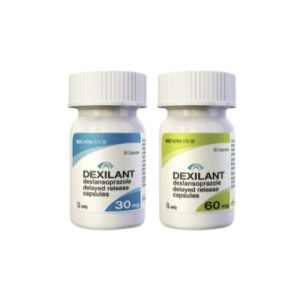Managing Gastroesophageal Conditions. In the dynamic world of modern medicine, new pharmaceutical advancements continuously offer hope to those in search of relief from chronic ailments. Among these advancements is Dexilant, specifically formulated to combat gastroesophageal issues such as gastroesophageal reflux disease (GERD). This post explores Sarah’s journey—a woman plagued by chronic heartburn and acid reflux—and her discovery of Dexilant. From understanding GERD’s underlying causes to evaluating Dexilant’s efficacy, we delve into how this medication has provided comfort and relief to countless individuals worldwide.
Chapter 1: The Struggle with GERD
Sarah had always been active and full of life until the day persistent and uncomfortable heartburn started disrupting her daily activities. Initially dismissing it as a minor annoyance, it quickly escalated to a constant struggle, severely affecting her sleep and eating habits. A visit to the doctor revealed she had gastroesophageal reflux disease (GERD), a condition characterized by stomach acid flowing back into the esophagus. Sarah soon realized that GERD isn’t just occasional heartburn—it can lead to esophageal damage and serious complications if not properly managed.
Chapter 2: The Search for Relief
Determined to reclaim her life, Sarah followed her doctor’s advice, adopting dietary changes and trying various home remedies. She slept with her head elevated, avoided spicy foods, and even tried herbal teas. Despite these efforts, the relentless heartburn persisted, leaving her feeling defeated. Desperate for a solution, she returned to her doctor.
Chapter 3: Discovering Dexilant
Empathizing with Sarah’s predicament, her doctor recommended a new medication called Dexilant. Offered in a simple white bottle, this medication contains the active ingredient dexlansoprazole, a proton pump inhibitor designed to tackle the root cause of GERD. Sarah learned that Dexilant works by reducing stomach acid production, alleviating heartburn, and protecting the esophagus lining. Intrigued and hopeful, Sarah embarked on this new chapter in her journey toward better health.
Chapter 4: Understanding the Mechanism
As Sarah began her Dexilant regimen, she became fascinated by its mechanism of action. Dexilant’s innovative dual-release technology allowed for two separate releases of the medication, providing extended and continuous acid suppression. This unique feature set Dexilant apart from other proton pump inhibitors, offering prolonged relief from GERD symptoms. Sarah was amazed at how the medication healed her esophageal tissue while reducing acid reflux discomfort, significantly improving her quality of life.
With Dexilant, Sarah’s struggle with GERD took a positive turn. The effective dual-release mechanism, along with her newfound understanding of her condition, provided the much-needed relief. Over time, her persistent heartburn and acid reflux became distant memories. Dexilant had not only eased her condition but also provided relief to many others suffering from gastroesophageal disorders.
What is Dexilant?
Dexilant, the brand name for dexlansoprazole, belongs to the class of medications known as proton pump inhibitors (PPIs). These drugs are highly effective for treating gastroesophageal disorders by reducing stomach acid production.
Conditions Treated by Dexilant
Dexilant is commonly prescribed for several conditions, including:
● Gastroesophageal Reflux Disease (GERD): A chronic condition where stomach acid frequently flows back into the esophagus, causing symptoms such as heartburn, regurgitation, and chest pain. Dexilant helps relieve these symptoms and promotes esophageal healing.
● Erosive Esophagitis: This condition occurs when the esophageal lining is damaged by stomach acid exposure. Dexilant effectively heals erosions and prevents further damage.
● Zollinger-Ellison Syndrome: A rare disorder characterized by excessive stomach acid production, Dexilant helps manage symptoms associated with this syndrome.
How Dexilant Works
Dexilant works by inhibiting the proton pump in the stomach lining, responsible for producing stomach acid. By reducing acid production, Dexilant alleviates gastroesophageal symptoms and promotes the healing of esophageal tissue.
Dosage and Administration
The dosage of Dexilant may vary based on the specific condition being treated and the patient. It is typically administered orally as delayed-release capsules, which should be swallowed whole and not crushed or chewed. The medication is usually taken once daily before a meal or as directed by a healthcare provider.
Benefits of Dexilant
Dexilant offers numerous benefits for individuals with gastroesophageal disorders, including:
● Symptom Relief: Dexilant effectively reduces GERD-related symptoms like heartburn, acid regurgitation, and chest pain, enhancing overall quality of life.
● Healing Properties: It aids in healing erosions and ulcers in the esophagus, promoting a healthier esophageal lining.
● Reduced Acid Production: By lowering stomach acid output, Dexilant reduces the likelihood of acid reflux and associated complications.
● Long-Lasting Relief: The delayed-release formulation provides sustained relief over 24 hours, resulting in fewer daily symptoms for patients.
Possible Side Effects
While Dexilant is generally well-tolerated, it may cause some side effects, including:
● Headache
● Nausea
● Diarrhea
● Abdominal pain
● Dry mouth
Severe side effects are rare but may include allergic reactions, kidney problems, and bone fractures. It is crucial to consult with a healthcare provider if any unusual or severe side effects occur.
Precautions and Considerations
Before starting Dexilant, patients should consider the following precautions:
● Inform your healthcare provider about any allergies or existing medical conditions.
● Discuss other medications and supplements you are taking, as Dexilant may interact with specific drugs.
● Long-term use of PPIs like Dexilant may lead to nutrient deficiencies, so regular monitoring and supplementation may be necessary.
● People with severe liver disease should avoid using Dexilant.
● Pregnant or breastfeeding individuals should consult their healthcare provider before using Dexilant.

